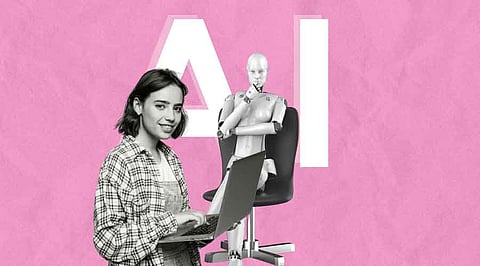

India, with its burgeoning tech landscape, has the potential to become a global leader in incorporating artificial intelligence (AI) technology into business operations. A recent report by PwC, titled 'India Workforce Hopes and Fears Survey 2023,' sheds light on the perceptions and aspirations of the Indian workforce regarding AI, upskilling, and the evolving job market.
According to the survey, 51% of Indian respondents believe that AI technology will enhance their productivity at work. This positive outlook surpasses the global average of 31%. This optimism stems from the understanding that AI when coupled with appropriate upskilling initiatives, can be a driving force for efficiency and innovation in the workplace.
The report suggests that India can capitalize on this optimistic mindset by adopting the right upskilling approach. Anumeha Singh, Partner at PwC India, emphasizes that organizations need to make tough choices, blending adaptability with innovative workforce structures and career pathways. The goal is to cater to the evolving needs of the workforce while ensuring job satisfaction and growth opportunities.
A significant revelation from the survey is that 62% of Indian respondents believe that the skills required for their jobs will undergo substantial changes in the next five years. This awareness of the need for upskilling is notably higher than the global average of 36%. Moreover, 69% of Indian respondents are well aware of how these skill requirements will change.
The urgency to upskill is evident as 53% of Indian employees view new skill development as a reason for taking up secondary jobs. This proactive approach to acquiring new skills positions the Indian workforce as forward-thinking and ready to embrace the challenges and opportunities presented by technological advancements.
The report underscores the dynamism in the Indian job market, with 42% of employees expressing the likelihood of changing jobs in the next year. The primary drivers for this inclination are expectations of better pay packages and promotions. Interestingly, 70% of Indian participants, in contrast to 35% globally, are willing to ask for an upgrade. It reflects a strong assertiveness among Indian workers in pursuing career advancement.
Kartik Rishi, Partner at PwC India, highlights the critical need for organizations to adopt a forward-looking, skills-first approach integrated into their business processes. This approach, according to Rishi, will be a critical factor in sustaining businesses over the next decade.
While the survey reveals a positive outlook toward AI, it also acknowledges some reservations. Approximately 24% of Indian respondents express concerns that AI could negatively impact the nature of their work, which is slightly higher than the global average. Additionally, 21% believe that AI might take over their jobs, compared to 13% globally.
Despite these concerns, the dominant sentiment, shared by 51% of respondents, is that AI will contribute to increased productivity and efficiency at work. This optimism underscores the belief that, with the right approach, AI can be a collaborative tool that augments human capabilities rather than a replacement.
The report highlights the positive work environment in India, with 73% of employees recommending their offices as good places to work. This endorsement surpasses the global average of 51%. Furthermore, 73% of Indian employees feel they can indeed be themselves at work, and 64% believe they can choose how to do their work in a way that suits them.
In conclusion, the PwC report paints a promising picture of India's readiness to embrace AI and navigate the evolving job landscape. With a focus on upskilling, proactive career choices, and a positive work environment, India stands poised to harness the full potential of AI and lead the way in integrating this transformative technology into business operations.
Join our WhatsApp Channel to get the latest news, exclusives and videos on WhatsApp
_____________
Disclaimer: Analytics Insight does not provide financial advice or guidance. Also note that the cryptocurrencies mentioned/listed on the website could potentially be scams, i.e. designed to induce you to invest financial resources that may be lost forever and not be recoverable once investments are made. You are responsible for conducting your own research (DYOR) before making any investments. Read more here.
